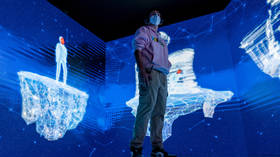Kids allowed into Metaverse strip clubs - BBC

Apps in the Metaverse are allowing children to experience inappropriate context, a BBC investigation has concluded. A researcher from the public broadcasting corporation posed as a 13-year-old girl in the virtual-reality VRChat app and witnessed grooming, sexual material, racism and a rape threat.
The researcher for BBC News used VRChat and signed up with the minimum possible age of 13 but was still able to visit virtual-reality rooms where avatars were simulating sex. The journalist was shown sex toys and condoms while being propositioned by several adult males.
She also witnessed racism, a rape threat and grooming.
One user told the BBC researcher that avatars can “get naked and do unspeakable things” while others spoke about “erotic role-play.” The Metaverse app allows kids to mingle freely with adults.
VRChat offers users the chance to meet as 3D avatars in a variety of rooms including innocent places like a McDonald’s restaurant and in not-so-innocuous settings such as pole-dancing and strip clubs.
The researcher used a Meta Quest headset, developed by Mark Zuckerberg’s Meta company, formerly known as Facebook. While VRChat is not made by the social media giant, it can be downloaded from an app store on a Meta Quest headset. There are no age checks and registration only requires a Facebook account.
The BBC researcher had signed up using a fake account.
Andy Burrows from the NSPCC (National Society for the Prevention of Cruelty to Children) told the BBC that improvements in online safety must be a matter of urgency.
Burrows labeled the BBC’s findings as “extraordinary.” “This is a product that is dangerous by design, because of oversight and neglect. We are seeing products rolled out without any suggestion that safety has been considered,” he said, blasting the lack of consideration for children and the harm it may cause them.
Meta claims it has the capacity to lock people out of its apps and is looking to make safety improvements “as it learns how people interact in these spaces.”
Zuckerberg is one of a number of tech moguls who believe that the future of the internet is in virtual spaces where people can live an entirely virtual life, conducting both work and leisure activities.













